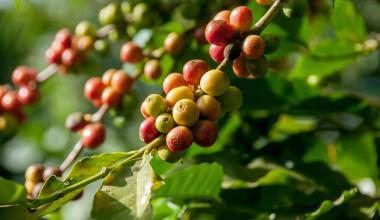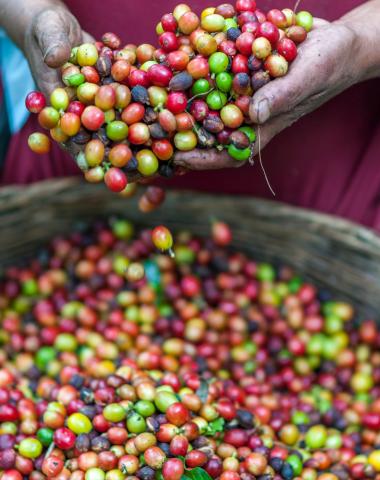Unveiling the Future Rules for Group Certification in Organic Farming!
IFOAM – Organics International together with the Research Institute of Organic Agriculture (FiBL) hosted the third and final webinar on 13 July 2023 to unveil the completed version of the “IFOAM Guidance & Explanation of Group Certification Requirements” according to the New EU Organic Regulation 2018/848.
We were delighted to welcome over 800 diverse participants to this event, with over 1400 registered to view the recording and receive the presentation. The guidance was presented by Florentine Meinshausen from FiBL while the whole event was moderated by Vladyslav Zhmailo and Te-Chun Chen from IFOAM - Organics International.
Watch the webinar here!
While most attendees were from certification bodies, processors, and traders, we also had representatives from governments, donor agencies, farmer organisations and farmers. This diverse mix of perspectives is crucial for addressing challenges and opportunities in the organic sector. Many participants expressed the view that the new regulation’ requirement will present significant challenges, and they stress the importance of additional support to overcome these difficulties.
Given that the new regulation won’t change at this point, the main aim of the webinar was to provide a much-needed simplified explanation and guidance on the new EU rules specifically for smallholder groups. But moving forward IFOAM - Organics International will continue to highlight and address the raised concerns and provide guidance or links to new resources as they become available to support our members and stakeholders.
Download the PowerPoint presentation here!
The European Union's (EU) Organic Regulation 2018/848 brings fundamental changes to group certification and internal control systems (ICS) in organic farming. The implications of the latest regulations extend globally, affecting around two million organic farmers worldwide currently certified in ICS groups, notably, those engaged in the production of commodities such as coffee, cocoa, sugar, cotton, rice, tropical fruits, nuts, spices and honey.
IFOAM - Organics International together with FIBL, IFOAM - Organics Europe, and leading experts in the field have developed guidance to analyse and explain the implications and major changes of the new EU Organic Regulation for producer groups worldwide since 2021.
The last remaining fundamental legal questions around the EU’s definition of a “Group of Operators” were eventually clarified in the European Commission’s updated Q&A document issued on 12 June 2023.
This legal clarification of the EU Commission and comprehensive stakeholder consultations conducted by our organisations showed that the new regulation for organic producer groups has more significant consequences and necessitates more comprehensive organizational changes than initially anticipated and communicated during previous events. The majority of currently certified smallholder producer groups will need to re-organise or set up new legal group entities that meet the EU’s definition of a “group of operators”. Organic operators worldwide will be expected to become “compliant” with all detailed and complex requirements of Regulation (EU) 2018/848 and its secondary acts, as the decade-old import system of “equivalence” is phased out by 31.12.2024.
IFOAM – Organics International together with FiBL conclusively hosted this third and final webinar on 23 July 2023 to unveil the completed version of “IFOAM Guidance & Explanation of Group Certification Requirements” according to the New EU Organic Regulation 2018/848.
IFOAM - Organics International still disagrees with the application of a specific clause of the EU Regulation to numerous certified groups in third countries. We believe that a strict word-by-word legal reading of a legal text fails to consider the existing organisational structures of these groups, their prior compliance with the Regulation, and the negative implications for them after compliance. Nevertheless, we have to inform our members and other stakeholders of upcoming requirements.
The upcoming enforcement of Regulation 2018/848 marks a major change in organic farming. Certification bodies should complete the inspections and issue new certificates according to the new rules before the end of 2024. These rules cover a wide range of areas and products, requiring all players in the organic supply chain to get involved. As the sector enters this transformative phase, transparency, accountability, and harmonisation become the key principles. Smallholder groups and other stakeholders are encouraged to get into contact with their certification bodies, consultants, governments or donor organisations to understand the details of these regulations and adjust their methods accordingly, as soon as possible.
Recording and Slides
For comprehensive insights, interested parties are encouraged to review the full webinar recording here. The webinar slides with the guidance PDF are also available here. Further information and resources can be accessed through the official websites of IFOAM - Organics International.
Acknowledgement
A special thanks to Te-Chun Chen, Florentine Meinshausen with Vladyslav Zhmailo for their contribution to this article.
This event and the guidance were prepared within the project Organic Trade for Development implemented by IFOAM - Organics International together with FiBL, IFOAM Organics Europe and Helvetas Swiss Intercooperation with support from the Swiss State Secretariat for Economic Affairs.

New EU Organic Regulation: Key Changes for Organic Producer Groups
Read more
Webinar on the New EU Organic Regulation: Key Changes for Organic Producer Groups
Read more

